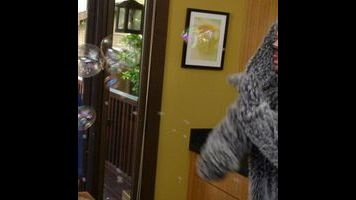And so we're back to Jenna. There are a few core premises to Wilfred, and, to be honest, by referring to the “what-is-Wilfred?” question as the main premise, I've done the show a slight disservice. Character relationships are as—or more—important than mythology, and the Jenna-Ryan relationship has been an essential part of Wilfred since it started airing.
The question, of course, is whether that's a good thing or not. The “will they/won't they” relationship has become an important part of television, across genres and networks. Sometimes it's useful for a show—the relationship with Jenna humanized Ryan in the first season. But sometimes it just seems to be there for its own sake. This had been resolved, Ryan had moved on, and suddenly we're back here again?
There's also the issue of scope. Heading toward the conclusion of the season, Wilfred appears to have decided that the most important thing it can do is to rekindle the Ryan-Jenna romantic relationship. Perhaps this could pay dividends later, but it makes the scope of this third season seem like a major step down in ambition from the second season. It also betrays one of the second season's better storylines, where both Ryan and Jenna seem to have come to terms with their manipulative relationship with one another, and put it in a healthy spot. That's no longer the case, and a satisfying characterization resolution has gone out the window.
On the other hand, having Jenna around has significant advantages for Wilfred. At the simplest level, Fiona Gubelmann is a charismatic actress, and her presence tends to give the show a level of straightforward energy that it often lacks with withdrawn Ryan and cynical Wilfred. Jenna's character also alters the relationship dynamics between Ryan and Wilfred. The former becomes more heightened, willing to manipulate to look good to Jenna, as well as being manipulable because of that desire. Wilfred, meanwhile, becomes more possessive and attached to Jenna, and less able to see the world outside of those boundaries, which makes him far less dominant over the show.
To put it simply, this alteration of relationships made “Heroism” far more comic than many Wilfred episodes. Wilfred's need to protect Jenna and their house makes him take on a pigeon family—“And they're all struttin' about, bobbin their heads to that black rapper shit playin' on their headphones…shit let's get out of here.” Wilfred's macho posturing combined with his less-than-brave actions (“Scaredy-cat,” Jenna calls him) may not be the most surprising humor, but it is consistently entertaining. And the scene when Wilfred attempts to pin a badge on himself is one of the funniest the show's ever done. “Ahhh! Gasp…gasp…I think I made a mistake….hurts…this really hurts.”
So I don't want to say that I disliked “Heroism.” But it does seem to be a case of a show that was once wildly creative starting to spin its wheels as it ages. I don't know if it's budget issues, network interference, or a deliberate choice by the producers, but I think that after a dozen episodes, it's fair to say that Wilfred isn't as interesting as it used to be, though it's still entertaining.
Stray observations:
- “I'm just yankin' yer junk, mannnnn! I know you've been busy.” Chris Klein is so wonderfully awful on this show.
- “I'm gonna do that through training, discipline, and searching Hero Dog to see what that even means.”
- “Property crime in Venice has increased by almost two percent in the last six months. I mean, this is our chance to take back the neighborhood!” I like how by many political/societal standards, Jenna's kind of terrible.
- “I'm a complete failure. My father was right about me when he looked me in the eye and said 'pant pant pant.'”
- A sign that the Jenna-Ryan kiss is being considered a major event by Wilfred: the in-credits clip was serious.

 Keep scrolling for more great stories.
Keep scrolling for more great stories.
